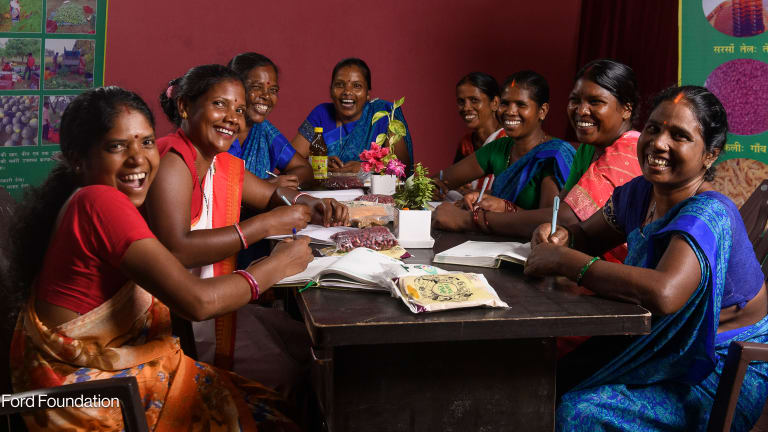
In May 1913, the Rockefeller Foundation trustees met for the first time to discuss the priorities of the young philanthropy, established under New York State charter with the mission to “promote the well-being” of humanity. A long-time advisor to founder John D. Rockefeller Sr., Frederick Gates made the case that the foundation should focus its work on disease, which he called the “supreme ill of human life.”
While the trustees couldn’t have known it then, this meeting would put into motion a century of health innovations, from the creation of the field of public health to the development of a vaccine for yellow fever to the establishment of infectious disease surveillance networks at the end of the 20th century.
Today, many other challenges have emerged that contribute to and reinforce the threats to well-being. From economic inequalities to climate change, these issues are much more complex and interconnected than what the foundation faced in 1913, requiring systemic solutions from across sectors to bring about lasting change.
Health challenges themselves have dramatically evolved as well. For one, as lifestyles have changed, so have the causes and nature of diseases themselves. The changing demographics of our planet – our aging, increasingly urban populations – demand different interventions and more sophisticated solutions to build and maintain healthy societies. As we’ve seen with the SARS outbreak and the spread of H1N1 over the last decade, viruses can move as quickly as a high-speed train or a 747.
To address the interrelated challenges of our modern world, the Rockefeller Foundation today focuses on global health as one component of our work to meet the dual goals of achieving more equitable growth and building greater resilience against the stresses and shocks of our modern world. In addition to advancing health, we work to transform cities, revalue ecosystems and secure livelihoods, as our main focus areas.
Our health work centers on transforming health systems with the goal of helping nations achieve universal health coverage, to relieve the disproportionate burden that out-of-pocket medical care puts on the poor and vulnerable.
We work towards UHC from both the technical and policy perspectives. On the technical side, we support the Joint Learning Network for UHC, a network of policy makers and practitioners from 10 countries in Asia, Latin America, and sub-Saharan Africa to share learning and identify innovative solutions to advance UHC at the country level.
In many of these countries, we pioneer innovative pilots aimed at reducing costs and expanding coverage. For example, through our pilot program in Chakaria, located in southeastern Bangladesh, we learned that local residents distrusted public hospitals so much that they were choosing to pay out of pocket for private care. To address this issue, we developed a prepaid health care package at a cost of about $15 annually per household, which covers medical consultations, hospitalizations, vaccinations and maternal health. Through grassroots marketing efforts, including leaflets and street fairs, enrollment in the package increased tenfold in the first half of 2012. We’re now using this wealth of data to refine the program and extract lessons for other parts of the country.

Click on the image to see in larger size.
At the policy level, we have worked to build the political will and enabling environments for UHC as a centerpiece of the global health agenda – and with real success. Last December, the United Nations General Assembly passed a resolution, sponsored by more than 90 countries, positioning UHC as the unifying health goal for the post-2015 agenda for sustainable development.
But we know that the problems we work to address today will be replaced with new issues and challenges 100 years from now. That’s why in January, nearly a century after that first Board meeting, we brought together leaders in health and innovation experts from around the world to Beijing for a Rockefeller Foundation Centennial Global Health Summit to help us dream the future of health for the next century. We heard truly exciting and promising ideas, from more participatory, democratic learning opportunities through massive open online courses, to an emerging field of epideminomics, combining the fields of epidemiology and economics. There was also a good deal of talk about the importance of not just global health, but planetary health – and a clear recognition that both are inextricably linked. The Rockefeller Foundation is taking a closer look at ways we can fold these insights into our future work and grant-making strategies.
But we also recognize that philanthropy cannot on its own solve the pressing health challenges that we face – rather, we must work to build the partnerships across all sectors to advance smart business practices, help government create equitable, pro-health policies, open new pathways to innovation, and attract new capital that will ensure progress can be sustained. For philanthropy’s part, we must continue to take the risks other sectors cannot, engage new actors from all sectors and regions, and provide mechanisms for constant, mutual learning to inform our progress.
From public health to e-health, it’s been an incredible journey, alongside extraordinary partners. We feel privileged to be able to do the work we do at this dynamic moment in our world. We may not know what the future holds, but with history as our guide, we are prepared for the century ahead.
Find out more about the ”Report on Global Giving: A New Era of Philanthropy and Investment in Global Health” by PSI in partnership with Devex and support by Fenton Communications, and sign up to receive PSI’s Impact magazine. Subscribe to The Development Newswire to receive top international development headlines from the world’s leading donors, news sources and opinion leaders — emailed to you FREE every business day.








